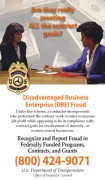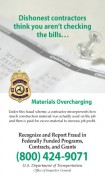Download and share the following fraud posters for your use in increasing awareness at your workplace of how to identify and report fraud, waste and abuse.

U.S. Department of TransportationCalvin L. Scovel III, Inspector General










